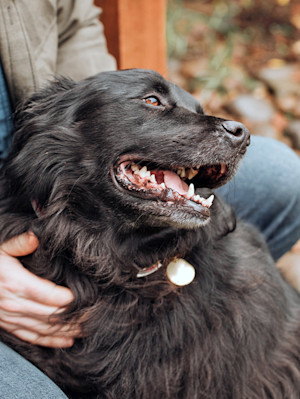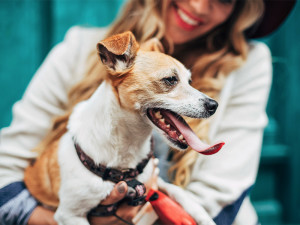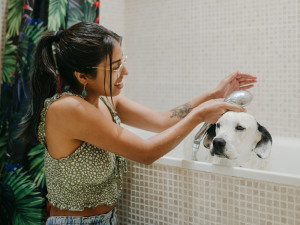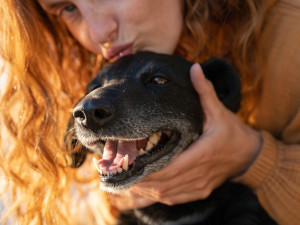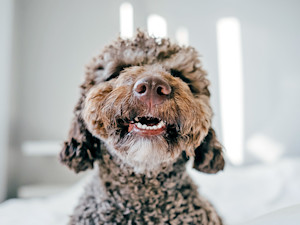How Much Does Dog Teeth Cleaning Cost?
Real talk: Your pup’s dental health is a necessary expense.

Share Article
In This Article:
Importance of Dental Health in Dogs Factors That Influence the Cost of Teeth Cleaning Average Cost of Teeth Cleanings Vet Clinic vs. Dental Specialist Costs How to Save Money on Dog Teeth Cleanings Risks of Low-Cost Dental Cleanings How Often Should You Have Your Dog’s Teeth Cleaned?
Dental and periodontal disease are the two most commonly diagnosed diseases in small-animal vet offices. As many as 85 percent of dogs and cats over three years of age have some degree of periodontal disease, which will worsen over time if no treatment is pursued. This can lead to bad breath, tooth loss, pain, infection in the mouth or elsewhere in the body, and more.
The good news is that dental and periodontal disease is preventable, and even reversible with treatment. Treatment involves cleaning the teeth, similar to how people have their teeth cleaned every six months at the dentist. This is different than daily brushing with a toothbrush, and involves scaling both above and below the gumline to remove hard tartar and bacteria-filled plaque, followed by tooth polishing. This will often include a full set of X-rays of your dog’s teeth to evaluate the extent (if any) of periodontal disease and look for any issues lurking below the gumline.
Two of the most common reasons why pet parents forego dental cleanings with their veterinarians include cost and the fear of anesthesia. Below, we discuss both.

Importance of dental health in dogs
Dental and periodontal diseases are incredibly common in dogs. And yet, a very small percentage of dogs will receive appropriate dental care throughout their lives.
Common dental problems in dogs
The following are frequent offenders causing issues with dog’s teeth and mouths:
Dental disease
Periodontal disease
Bad breath
Gum disease and inflammation
Tooth loss
Oral pain and infection
Systemic infection
Factors that influence the cost of dog teeth cleaning
Size and breed of dog
In general, large dogs will require more anesthetic medication, as well as more X-ray images of their teeth, given that their mouths and teeth are bigger.
Location
Just like the cost of living, the average price of a dental cleaning and any necessary oral surgery (or additional treatments) will vary based on your geographic location.
Type of veterinary clinic
There are generally two places pet parents can elect to have a tooth cleaning done: Either with their dog’s primary care veterinarian or with a boarded dental specialist at another facility (usually for more advanced or specialized procedures). Typically, the cost of the procedure with a boarded dentist is more expensive.
Additional procedures
Oftentimes, the cost of the dental procedure will depend on whether or not your dog requires any oral surgery on top of the scaling and polishing. This decision is based mostly on the dog’s oral exam (while they are under anesthesia), the probing of each individual tooth, and their dental X-rays.
Sedation and anesthesia costs
The cost of anesthesia will vary based on your pet’s size, the length of sedation, and any additional medications your pet may require following their procedure.
Average cost of dog teeth cleanings
Basic cleanings
This cost can vary based on the country where you live, and if insurance covers any of the costs. But in general, the cleaning (which includes the anesthesia) can range from $350 to $900, give or take.
Anesthesia costs
If your dog requires additional anesthesia, like for further treatments or oral surgery, this price can vary based on the time they need to be sedated. An estimate can typically be given to you by your veterinarian.
Costs for additional procedures
If your dog requires additional treatments, such as a tooth extraction or even a crown, this will involve additional costs, which can vary depending on who is performing the procedure and your location.
Comparing vet clinics vs. pet dental specialist costs
Price shopping for the lowest cost of a dental cleaning is very common in veterinary practice. But keep in mind that the lowest cost may not yield the best care. It is important to ask practices which processes they have in place to make the procedure as safe as possible.
Anesthesia is a necessary part of thorough dental cleaning in dogs — performing this on a dog who’s awake and non-anesthetized has ethical and safety concerns. Although the use of anesthesia comes with some risk, that risk is low if administered by a well-trained team. Generally, the cost at a general vet is less than the price at a veterinary dental specialist, since the specialist is board-certified and often performs more specialized care.
How to save money on dog teeth cleanings
Regular at-home dental care
The best way to save money is to prevent plaque buildup through regular tooth brushing. This might not be something your dog allows right away, especially if they aren’t used to it. But with time, patience, and making it part of their routine, they’ll get used to brushing in no time. Additionally, the Veterinary Oral Health Council’s websiteopens in new tab has a list of effective products to help keep your dog’s teeth clean.
Pet insurance and dental coverage
Some pet insurance includes the cost of dental procedures in their coverage. Ask your veterinarian if a plan that includes dental care is right for you and your dog. In general, smaller breed dogs, or dogs who are not amenable to daily brushing, might require more frequent dental visits, making this coverage worth considering.
Preventative care plans
Some veterinary practices have preventive care or wellness plans that include the cost of a dental cleaning each year. This is a nice option for many pet parents.
The risks of low-cost dental cleanings
Low-cost or subsidized dental care is something that is available through several SPCA or humane societies, and may be a good option for many pet parents. It is always good to inquire about what the procedure itself will involve, and which safeguards their practices have implemented to ensure the procedure is as safe as possible.
Many grooming facilities and even some veterinary practices provide anesthesia-free or non-anesthetic dental cleanings. Per the American Animal Hospital Association (AAHA) and the American Veterinary Dental College (AVDC), anesthesia-free canine dentistry comes with ethical, safety, and efficacy concerns.
Scaling a dog’s teeth with sharp instruments can be stressful and painful for your dog. And it is not possible to perform a thorough cleaning above and below the gumline — as well as full oral X-rays — when a dog is fully awake. The anesthesia is a necessary part of this procedure, and when performed with a well-trained team, is associated with low risk.
How often should you have your dog’s teeth cleaned?
The frequency at which a dog’s teeth should be cleaned will vary by dog. In general, smaller dogs, especially those who do not receive regular at-home care will require cleanings more frequently than larger dogs. It is recommended that most dogs receive their first dental cleaning and X-rays by three years of age. However, your veterinarian can help you determine how often your dog will require these procedures.
FAQs
Is it worth getting your dog’s teeth cleaned?
Absolutely, it’s worth getting your dog’s teeth cleaned. An estimated 85 percent of dogs three years of age and older have some degree of dental and periodontal disease, which will worsen if left untreated.
This is more significant than bad breath and can lead to infection in the mouth or other organs of the body. In severe cases, a dog could have loose teeth or tooth loss, which can impact their quality of life due to pain and discomfort. As with people, regular dental care is an essential part of your dog’s overall health.
Why is dog teeth cleaning so expensive?
There are a couple of reasons why dog teeth cleaning can be expensive. First, pet insurance isn’t standard in veterinary care, so the cost is mostly out-of-pocket for the pet parent. Second, anesthesia is a necessary part of a dog dental procedure, because it is impossible to perform a thorough tooth scaling above and below the gumline while a dog is awake. The anesthesia contributes to the overall cost of the procedure.
Does pet insurance cover teeth cleaning for dogs?
Some pet insurance plans will include dental cleanings in their coverage. It is best to ask before enrolling. Additionally, some veterinary clinics sell wellness or preventive care plans that include dental cleanings.
References
Belvoir Media Group. “Periodontal Disease.” Cornell University College of Veterinary Medicine, 3 Jan. 2023, www.vet.cornell.edu/departments-centers-and-institutes/riney-canine-health-center/canine-health-information/periodontal-disease.

Dr. Gabrielle Fadl, DVM
After graduating from Kansas State University College of Veterinary Medicine, Dr. Fadl returned to the New York area to pursue a one-year rotating internship and has been working in general practice since. Dr. Fadl loves working in the pet space to foster the powerful human-animal bond. She hopes to continually learn and grow to practice the best quality medicine. Her motto is “Keep calm and try to take it as it comes.”
Related articles
![Outdoor shot of a woman holding her dog.]()
Doggie Dental Care: How to Choose the Best Toothbrush for a Puppy
Those pearly whites need all the attention they can get.
![Woman carefully cleaning a dog in a bathtub.]()
How to Groom Your Dog at Home: the Complete Guide
Spa days can happen at home.
![Close up of red headed woman holding a black dog's face showing his teeth]()
They’re Just Like Us: Dogs Get Gingivitis
Dogs can suffer from gum disease, too. Here’s how to prevent it.
![Brown poodle dog's teeth chattering.]()
Why Are My Dog’s Teeth Chattering and What to Do
We can help you get to the bottom of the issue.


